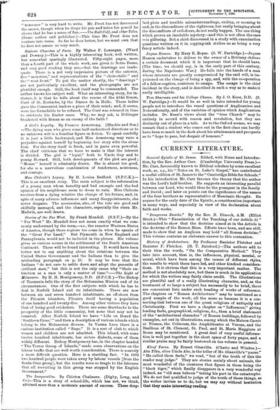Stories of the Far West. By Frank Mundell. (S.S.U.)—By the
"Far West" Mr. Mundell does not mean exactly what we com- monly understand by the term,—i.e., the remoter Western States of America, though these regions too come in when he speaks of the "Great Fur Land." But Plymouth in New England and Pennsylvania would not be included in the phrase. His volume gives us various scenes in the settlement of the North American Continent. These will be found interesting. It would have been better not to say anything about the relations between the United States Government and the Indians than to give the misleading paragraph on p. 21. It may be true that the Indians "do not care to settle down and adopt the pursuits of civilised man," but this is not the only cause why "their ex- tinction as a race is only a matter of time."—The Light of Melanesia. By H. H. Montgomery, D.D. (S.P.C.K.)—The Bishop of Tasmania tells the story of the Melanesian Mission and of its circumstances. One of the first subjects with which he has to deal is Norfolk Island and its inhabitants. There are now between six and seven hundred inhabitants, an off-shoot from the Pitcairn islanders, Pitcairn itself having a population of one hundred and twenty-five. Among other virtues they have that of being good cricketers. There are some drawbacks to the prosperity of the little community, but none that may not be removed. After Norfolk Island we have "Life on Board the 'Southern Cross,'" and then a description of various islands which belong to the Melanesian diocese. In Vans Lava there is a curious institution called " Suge." It is a sort of club to which women and children are not admitted. This island, with some twelve hundred inhabitants, has sixteen dialects, some of them widely different. Bishop Montgomery has, in the chapter headed "The Torres Group of Islands," made some observations on the labour traffic that are well worth consideration. There is scarcely a more difficult question. Here is a startling fact. "In 1883 two hundred people were taken away by labour vessels [from the Santa Cruz group], but the results were so tragic to the labourer that all recruiting in this group was stopped by the English Government."


















































 Previous page
Previous page